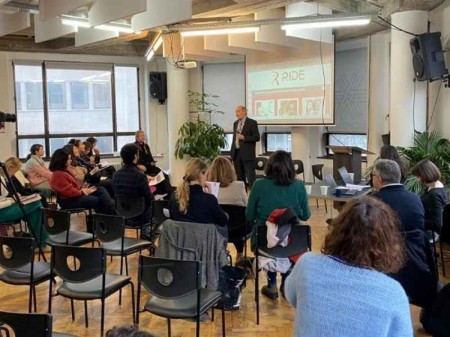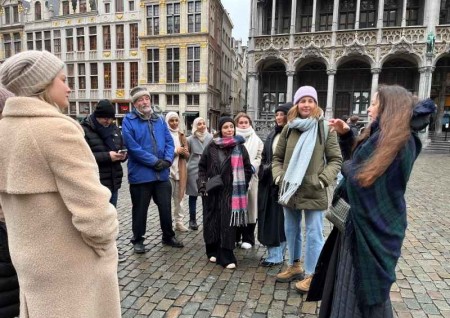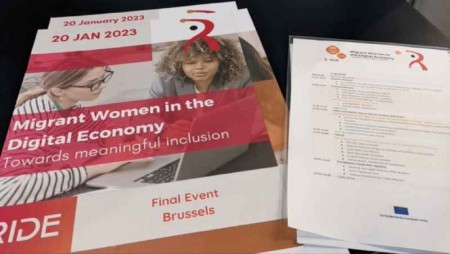“Migrant Women in the Digital Economy. Towards meaningful inclusion” was the topic of the final event of the RIDE project, an initiative supported by the European Commission. The project was developed as a joint effort to strengthen the capacity of migrant and refugee women to enter the digital job market through integrated approaches in six European countries.
The final event held in Brussels last week with the active participation of representatives of the Bulgarian Chamber of Commerce and Industry highlighted how RIDE and similar initiatives can accelerate the participation of women in digital and technology sectors, advance the well-being and up/re-skilling of migrant and refugee women, contribute to socio-economic development and innovation, and foster partnerships across countries and sectors.
Within the RIDE initiative, project partners have delivered training and coaching for over 100 migrant women in different European countries in 2021 and 2022 and created an interactive, online map with more than 100 references of digital skills training opportunities for migrant and refugee women. As its flagship activity, a job fair for migrants was organised in each country this year. Over 40 employers and over 200 migrant women took part in job fairs in different countries.
Speakers at the final event, including project partners, shared key lessons learned, and explored ways to strengthen the capacity of migrant women in the digital economy as a critical contribution to their social inclusion and the economic benefit of the host country.
During the panel discussion Ursula Hoenich from the European commission, DG Migration and Home Affairs stated out that integration is part of the migration policy. She outlined the context – the specific challenges for migrant women, how integration is approached by the European Commission and what is done to fill in the “migration gender gap”. The issues, challenges and problems related to integration have to be translated more into action for the new EC plan 2024 – 2027. She put focus on European Action plan on integration and inclusion 2021-2027. The sectorial priorities in it were presented: education, employment, health and housing. Each sectorial priority is connected to various horizontal priorities. Examples for them are: building strong partnerships, increased EU funding for integration, fostering participation in host societies, enhanced use of digital tools for integration, monitoring process.
Tim Van Rie from the European Commission, DG Employment, Social Affairs and Inclusion elaborated on the digital skills and inclusion. He pointed out the inspiring start of the event. According to him the RIDE project is quite specific and covers many angles and sectors the European Commission is covering. He looked back at the mandate of the Commission 2019-20024. The project fits two priorities of the mandate namely: “Europe fit for the digital age” and “An Economy that works for the people”.
Tim pointed out that digital transition was accelerated during the COVID 19 pandemic, showcasing the potential of digitalization. Digital literacy is very cross cutting. It is important for the labour market, education and trainings, access to services /public communication, health, etc./.
He shared the EU target at least 80% of the population aged 16-74 to have basic digital skills by 2030. He made a short quiz for the level of possession of basic digital skills and followed it with updated data – 54% for EU.
He stressed on the ICT specialists since there is a talent shortage – 55% of enterprises report that there are difficulties finding them. There is increasing demand – ICT specialists are more and more important and demanded. Advanced digital skills are required in all sectors.
The target of the European Commission is to have 20 mill people with basic digital skills in EU by 2023 with convergence in gender gap. Latest data shows 9 mill ICT specialists in 2021, 19% of them are women. The current rate of increase is insufficient to reach the target.
The Commission is trying to learn from the best countries in this regard.
Lina Konstantinopoulou, Policy Director at Eurochambres elaborated on the vocational and educational programmes for migrant women implemented by Eurochambres. She also confirmed that RIDE project is very inspiring. Lina pointed in her speech the position of Eurochambres on the topic, some activities and projects too.
Eurochambres being one of the biggest associations in Brussels represents 43 national CCIs and 4 transnational organizations. It also represents Chambers of Commerce from the Eastern Partnership. Eurochambres does policy work on many priorities of the Commission. The organization welcomes the initiatives of the European Commission for increasing skills.
Chambers of Commerce have different structures across Europe but the role of Eurochambres is dual – to support governments in drafting and crafting policy in skills area and to provide education and training also VET.
Eurochambres recently signed with other European stakeholders The European Partnership for integration – commitment to integrate migrants on the European market of labour.
The event provided a chance for migrant women themselves to share their perspectives on labour market integration, training opportunities and skills. Sara and Alawia Alkaf, originating from Yemen but living in Sofia, talked about their experience as participants in the Creative Design Course, organized by the Bulgarian Chamber of Commerce and Industry.


